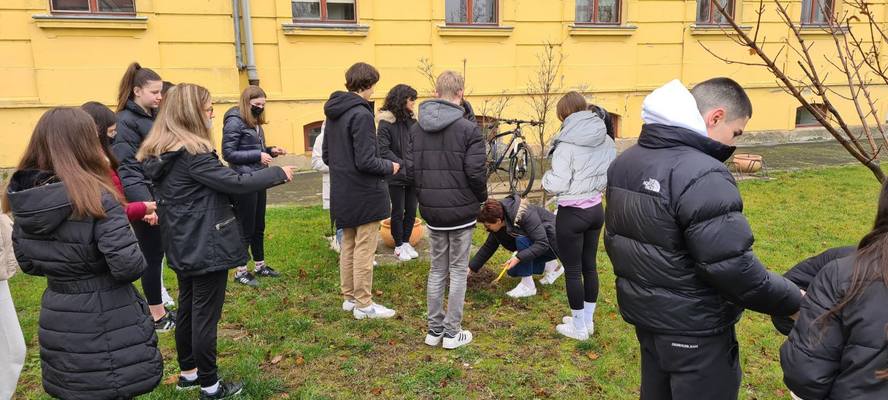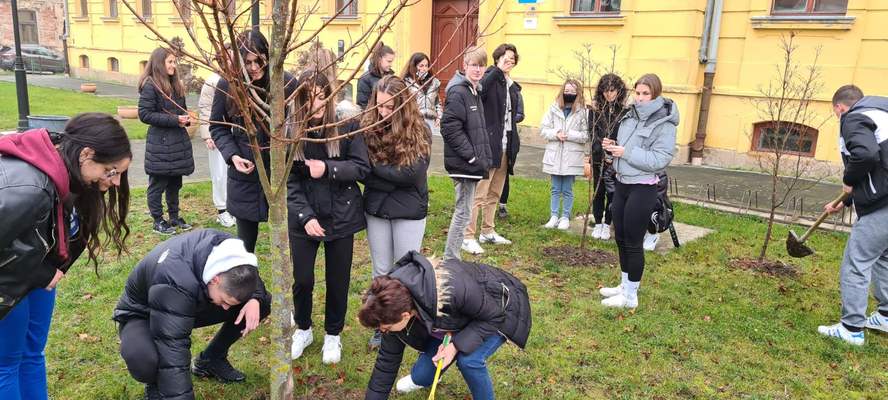Ispred zgrade škole posadili smo lukovice šafrana u spomen na milijun i pol židovske djece i tisuće druge djece stradale tijekom Holokausta. Cilj je aktivnosti podizati svijest učenika o opasnostima diskriminacije, predrasuda i rasizma pri čemu sadnjom šafrana i njihovim nicanjem simbolično šaljemo poruku o nadi u bolje sutra. Uključivanjem učenika u sadnju lukovica i promatranje cvijeća kako raste potičemo kontinuirano učenje o važnosti tolerancije i poštovanja.
Žuti cvjetovi podsjećaju na žute Davidove zvijezde koje su Židovi bili prisiljeni nositi pod nacističkom vlašću. Šafran cvate krajem siječnja ili početkom veljače, otprilike u vrijeme Međunarodnog dana sjećanja na Holokaust (27. siječnja). Želja nam je omogućiti učenicima da izgrade čvrsti stav te da aktivno šire uvjerenja tolerancije i mirnog suživota u raznolikosti koja oplemenjuje okolinu u kojoj žive.
Rezolucija UN-a pozvala je zemlje da "razviju obrazovne programe kojima će poučiti buduće generacije kako bi mogli prenositi pouku o holokaustu kako bi se spriječila buduća djela genocida." U njemu se navodi da UN bez rezerve osuđuje sve manifestacije vjerske netolerancije, poticanja, uznemiravanja ili nasilja nad osobama ili zajednicama na temelju etničkog ili vjerskog porijekla vjerovanje, gdje god da se pojave.
Ovom aktivnošću doprinosimo ostvarivanju ciljeva održivog razvoja: osiguravamo kvalitetno obrazovanje djece i mladih (Cilj 4), smanjujemo nejednakost (Cilj 10), sudjelujemo u očuvanju života na zemlji (Cilj 15) i osiguravamo mir, pravdu i snažne institucije (Cilj 16).
Zajedničko prisjećanje na zločine holokausta i zajednički rad kako bi se osiguralo da se takva povijest nikada ne ponovi, put je kojim treba ići. Obveza današnjih generacija je poduzimati mjere za sprječavanje katastrofa, učiti iz prošlosti i graditi društvo u kojem se prema svima postupa jednako i u kojem nitko nije izostavljen. Ciljevi održivog razvoja (SDG) nacrt su za postizanje bolje i održivije
budućnosti za sve.


Outside the school building, we planted saffron bulbs in memory of a million and a half Jewish children and thousands of other children who died during the Holocaust. The aim of the activity is to raise students' awareness of the dangers of discrimination, prejudice and racism, symbolically sending a message of hope for a better tomorrow by planting saffron and sprouting them. By involving students in planting bulbs and watching flowers grow, we encourage continuous learning about the importance of tolerance and respect.
The yellow flowers resemble the yellow stars of David that Jews were forced to wear under Nazi rule. Saffron blooms in late January or early February, around the time of International Holocaust Remembrance Day (January 27). Our desire is to enable students to build a firm attitude and to actively spread beliefs of tolerance and peaceful coexistence in diversity that ennobles the environment in which they live.
The UN resolution urged countries to "develop educational programmes to teach future generations so that they can convey the lessons of the Holocaust in order to prevent future acts of genocide." It states that the UN condemns without reservation all manifestations of religious intolerance, incitement, harassment or violence against persons or communities based on ethnic or religious origin belief, wherever they arise.
With this activity, we contribute to achieving the SDGs: we ensure quality education for children and young people (Goal 4), reduce inequality (Goal 10), participate in the preservation of life on earth (Goal 15) and ensure peace, justice and strong institutions (Objective 16).
Remembering the crimes of the Holocaust together and working together to ensure that such history is never repeated and is the way to go. The obligation of today's generations is to take these measures to prevent disasters, teach you from the past and build a society in which everyone is treated equally and in which no one is left behind. The Sustainable Development Goals (SDGs) are a blueprint for achieving a better and more sustainable future for all.